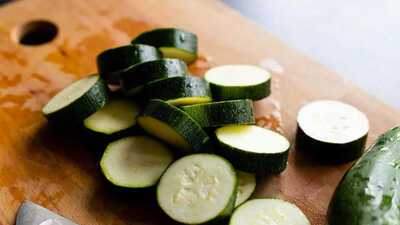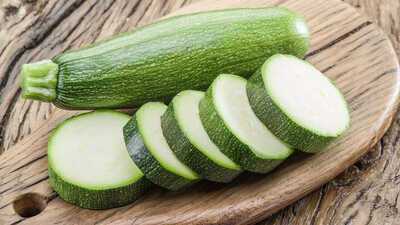Zucchini, also called courgette, is a popular summer vegetable loved for its mild taste, low calories, and high nutritional value. Packed with fibre, antioxidants, and vitamins, it’s a favourite in healthy diets across the world. But did you know that this seemingly harmless vegetable can sometimes turn toxic? In rare cases, zucchini can contain bitter compounds called cucurbitacins that may lead to serious food poisoning.
A recent study published in the Polish Archives of Internal Medicine described a case where a 54-year-old healthy woman was hospitalized with severe abdominal pain, vomiting, and bloody diarrhoea after eating zucchini bread. She was later diagnosed with liver damage, a shocking reminder that zucchini poisoning, though uncommon, is real. So, why does this happen and how can you protect yourself? Let’s break it down.
Causes of zucchini poisoning

Cucurbitacins
Cucurbitacins are naturally occurring bitter compounds found in gourds, including zucchini. In high concentrations, they act as toxins, causing nausea, diarrhoea, and even organ damage. Normally, cultivated zucchini is bred to have very low cucurbitacins, but under certain conditions, the levels may rise dangerously.
Cross-pollination
If zucchini plants cross-pollinate with wild or ornamental gourds (which often have high cucurbitacin levels), the resulting fruit may inherit bitterness and toxicity. This risk is greater in home gardens where different gourds are grown close together.
Environmental stress
Factors like drought, heat stress, or irregular watering can increase cucurbitacin levels in zucchini. A stressed plant tries to defend itself by producing more of these bitter compounds.
Improper seed selection
Saving seeds from previous crops without checking can lead to zucchini varieties that naturally carry higher cucurbitacin content. This makes homegrown zucchini more unpredictable than store-bought ones.
Symptoms of zucchini poisoning
If you accidentally consume toxic zucchini, symptoms usually appear quickly – within hours. Watch out for:
Prevention tips for avoiding zucchini poisoning

If you experience symptoms like vomiting, diarrhoea, or severe stomach pain after eating zucchini, stop eating immediately and seek medical attention. Drink plenty of fluids to prevent dehydration, but in severe cases, hospital treatment may be necessary to avoid complications.
Zucchini is a nutritious, low-calorie vegetable enjoyed in kitchens around the world and it's generally safe for most people. But there's one important thing to watch out for: bitterness. If your zucchini has a noticeably bitter taste, do not ignore it. That sharp flavor can be a sign of naturally occurring toxins called cucurbitacins, which, in rare cases, can lead to a condition known as toxic squash syndrome. This can cause nausea, vomiting, stomach cramps, and in extreme cases, even a trip to the emergency room.
While such cases are rare, being aware of this warning sign can help you avoid unpleasant or harmful reactions. When in doubt, trust your taste buds, if your zucchini tastes unusually bitter, it's safer to discard it. Staying informed about even the healthiest foods is an important part of protecting your well-being.
Also read| 5 people who should never eat papaya: Health risks you should know
A recent study published in the Polish Archives of Internal Medicine described a case where a 54-year-old healthy woman was hospitalized with severe abdominal pain, vomiting, and bloody diarrhoea after eating zucchini bread. She was later diagnosed with liver damage, a shocking reminder that zucchini poisoning, though uncommon, is real. So, why does this happen and how can you protect yourself? Let’s break it down.
Causes of zucchini poisoning
Cucurbitacins
Cucurbitacins are naturally occurring bitter compounds found in gourds, including zucchini. In high concentrations, they act as toxins, causing nausea, diarrhoea, and even organ damage. Normally, cultivated zucchini is bred to have very low cucurbitacins, but under certain conditions, the levels may rise dangerously.
Cross-pollination
If zucchini plants cross-pollinate with wild or ornamental gourds (which often have high cucurbitacin levels), the resulting fruit may inherit bitterness and toxicity. This risk is greater in home gardens where different gourds are grown close together.
Environmental stress
Factors like drought, heat stress, or irregular watering can increase cucurbitacin levels in zucchini. A stressed plant tries to defend itself by producing more of these bitter compounds.
Improper seed selection
Saving seeds from previous crops without checking can lead to zucchini varieties that naturally carry higher cucurbitacin content. This makes homegrown zucchini more unpredictable than store-bought ones.
Symptoms of zucchini poisoning
If you accidentally consume toxic zucchini, symptoms usually appear quickly – within hours. Watch out for:
- Severe abdominal pain and cramping
- Nausea and repeated vomiting
- Watery or bloody diarrhoea
- Dehydration and weakness
- Liver damage in rare, severe cases
Prevention tips for avoiding zucchini poisoning
- Taste test first: If zucchini tastes unusually bitter, stop eating it immediately.
- Buy from trusted sources: Commercially grown zucchini is usually safer as it is bred to be low in cucurbitacins.
- Avoid stressed plants: Don’t consume zucchini that looks unusually small, misshapen, or bitter, these may come from stressed plants.
- Be cautious with homegrown produce: Avoid saving seeds from bitter-tasting zucchini for future planting.
- Cook properly: While cooking doesn’t destroy cucurbitacins, bitter flavour becomes more noticeable when heated, making it easier to detect.
If you experience symptoms like vomiting, diarrhoea, or severe stomach pain after eating zucchini, stop eating immediately and seek medical attention. Drink plenty of fluids to prevent dehydration, but in severe cases, hospital treatment may be necessary to avoid complications.
Zucchini is a nutritious, low-calorie vegetable enjoyed in kitchens around the world and it's generally safe for most people. But there's one important thing to watch out for: bitterness. If your zucchini has a noticeably bitter taste, do not ignore it. That sharp flavor can be a sign of naturally occurring toxins called cucurbitacins, which, in rare cases, can lead to a condition known as toxic squash syndrome. This can cause nausea, vomiting, stomach cramps, and in extreme cases, even a trip to the emergency room.
While such cases are rare, being aware of this warning sign can help you avoid unpleasant or harmful reactions. When in doubt, trust your taste buds, if your zucchini tastes unusually bitter, it's safer to discard it. Staying informed about even the healthiest foods is an important part of protecting your well-being.
Also read| 5 people who should never eat papaya: Health risks you should know
You may also like

Female medico dies by suicide after consuming medicine in Karnataka

South Korea: Special counsel seeks arrest warrant for shaman in bribery probe against ex-first lady

Spain wildfires: Urgent warning with 'extreme danger' in tourist hotspots

New Look just dropped the perfect Chanel-inspired ballet flats for under £20

Guiding Light: 'I Am Nothing!'







